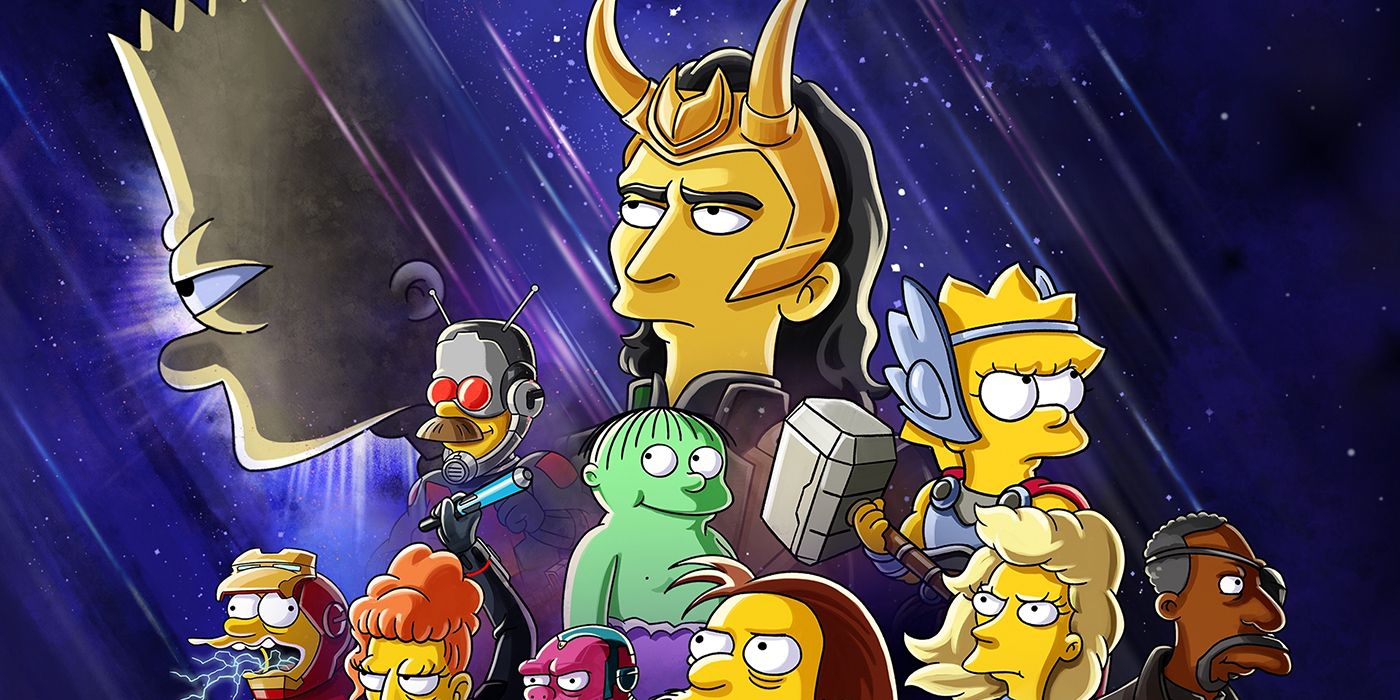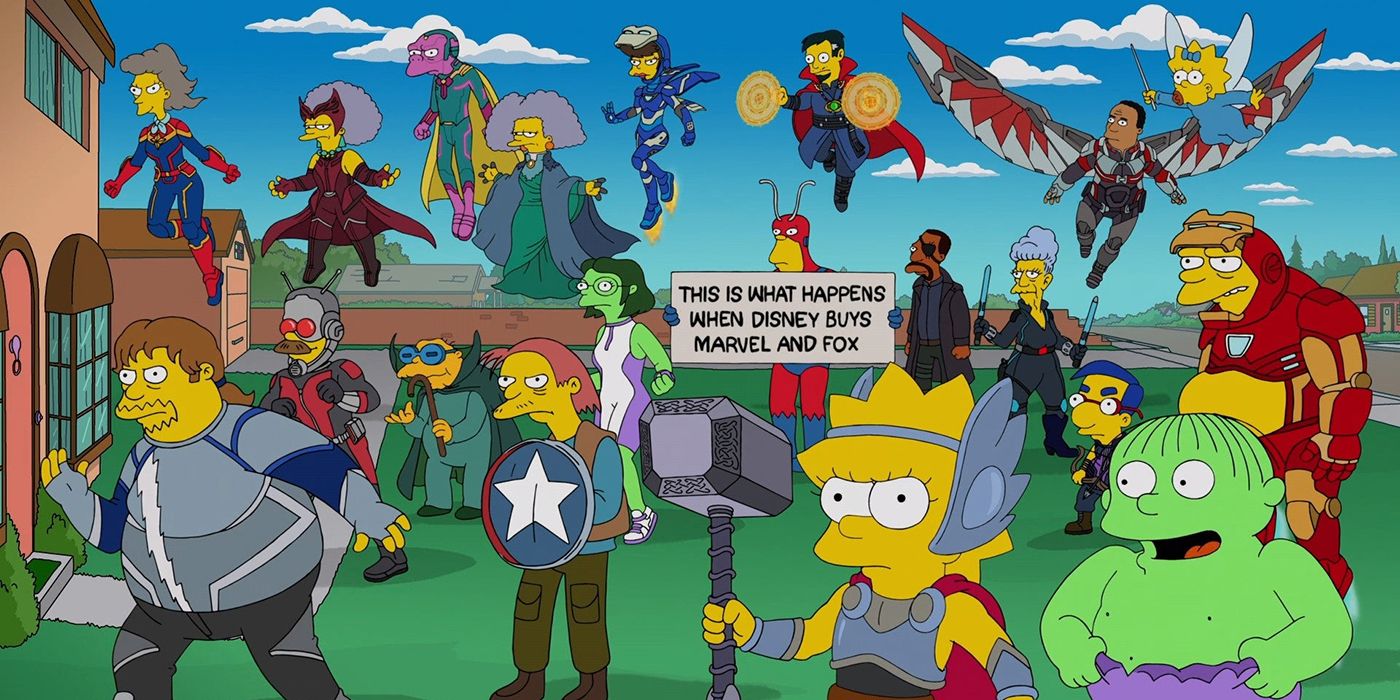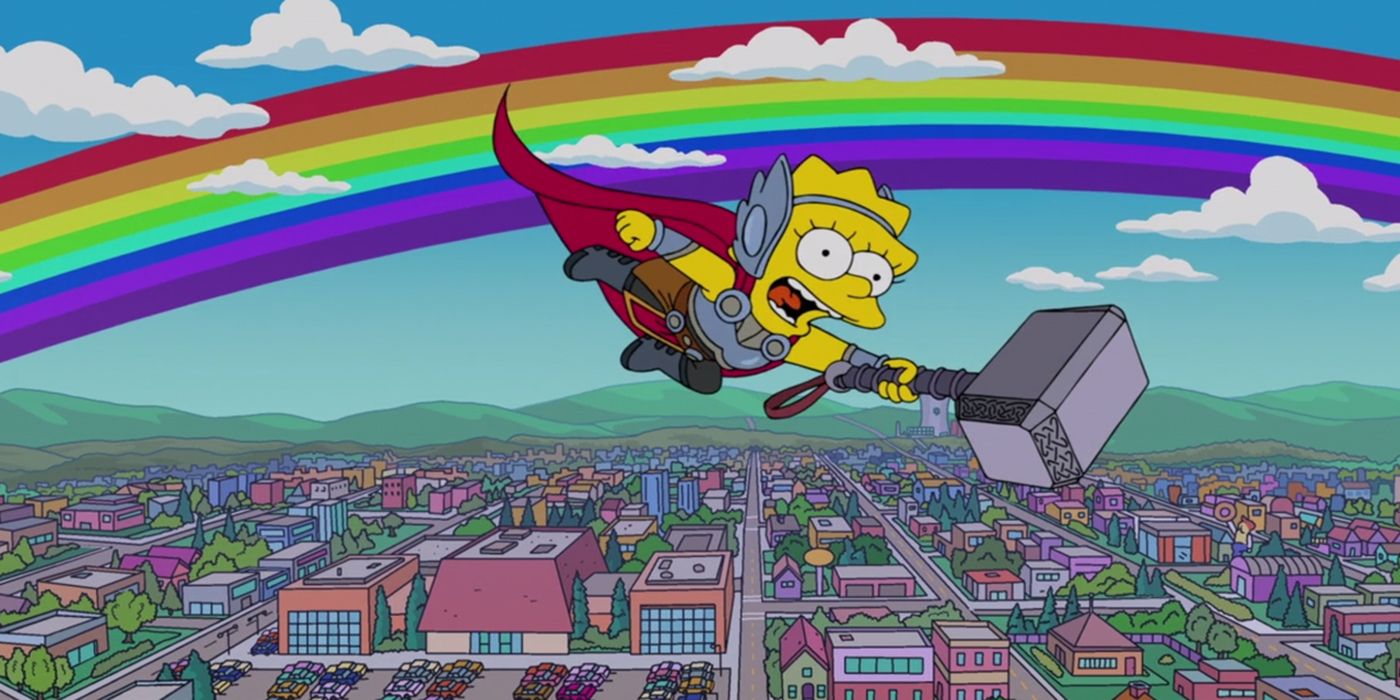
During the climax of The Simpsons: The Good, The Bart, and The Loki, a Marvel Studios-Simpsons crossover animated short streaming on Disney+, the writers wave the white flag. Lisa Simpson, having just been deemed worthy of Thor’s hammer Mjolnir, introduces “The Springfield Avengers,” a cavalcade of local friends, neighbors, and classmates fashioning tightly accurate attire of the Marvel menagerie. Near the center of the assembly - which features inspired fusions like Selma Bouvier as Agatha Harkness and Hans Moleman as the literal Mole Man - Rainier Wolfcastle (the franchise’s Arnold Schwartzneggar stand-in) holds a sign while dressed in the original 1960s Ant-Man suit: “This is what happens when Disney buys Marvel and Fox.”
At first, the sign reads as a snarky wink-and-nod to the nature of the short’s existence as a tie-in to Marvel's Loki limited series, a gag not too distant from the copious quips and cracks that define the MCU’s sense of humor. But when the short ends 45 seconds later, the self-aware signage starts to reek of commercial-branded exhaustion, communicated from the creatives to their audience: “We’re tired of this too.” The Good, The Bart, and The Loki embodies The Walt Disney Company at its coldest and most corporate.
RELATED: Is Classic Loki The MCU's Original God Of Mischief?
Banished to Springfield by his father Odin, Loki’s brief stint in Springfield includes impressing Homer with replication magic, teleporting Lisa to Asgard, and preaching the existential horrors of climate change to an unsuspecting crowd at Moe’s Tavern. That the short lacks narrative ambition is a saving grace - The Good, The Bart, and The Loki doesn’t portend any meaning or substance onto its scenario, resulting in a 4-minute experience that is, if nothing else, inoffensive.

Making good on its premise, Marvel receives a 5-star treatment: In addition to the aforementioned “Springfield Avengers,” fans of both properties will also enjoy the gorgeous art accompanying the credits, depicting scenes like Comic Book Guy Thanos executing “The Blip” and Maggie Simpson watching the second episode of WandaVision, recast with Milhouse’s parents. Loki himself is also Simpsonized excellently, with a design that lends itself well to his signature elegance and smugness, brought to life by guest star Tom Hiddleston. The inevitable post-credits scene is also enjoyable, remaking and rewriting the iconic court hearing scene from the first episode of Loki, complete with Ravonna Renslayer and Hunter B-15 from the show.
These surface-level pleasures do little to distract from the joylessness encircling the production, however. Although “The Simpsons has been on for too long” is one of the coldest hot takes in modern media discourse, this short does nothing to challenge that claim. Five writers are credited on the short - including longtime Simpsons showrunner Al Jean - yet the series’ signature snappy satire and absurdity are nowhere to be found. The humor throughout is tired and drab, and even if it's aimed at an audience younger and less self-aware than the usual Simpsons viewer, that doesn't excuse the stilted exchanges and flat jokes (what kind of punchline is “the last thing this world needs is more pork chops”?).
Drudging up so much vitriol over an animated short that doesn't even meet the 5-minute mark may seem like an overreach, but the unbridled corporatism bursting out of each frame makes a much stronger impression than any of the ho-hum antics depicted. Like bullets on a schedule, Homer eats, Barney burps, and Bart screams his trademark catchphrase "¡Ay caramba!" But it's not the bits and pieces of Simpsons routines that hurt the crossover the most. At the hollowed core of The Good, The Bart, and The Loki is a severe lack of passion, an ingredient essential to the MCU's winning recipe.

One of the key reasons Marvel Studios remains such a powerful entity in the cinematic space over a decade after its creation is that its productions are almost always in the hands of passionate creatives. Regardless of their corporate origins, the stories of Wanda Maximoff's self-destructive grief, Sam Wilson's conflicting obligations, and Loki's grapple with predestined failure are not simply items from an MCU vending machine, despite what cynics on social media may claim. Say what you will of WandaVision's lackluster ending, The Falcon and the Winter Soldier's overcrowded storytelling, and Loki's frustrating pacing; it's abundantly clear that passionate creators - whether it be Jac Schaeffer, Malcolm Spellman, or Michael Waldron - wanted to tell these stories.
By contrast, it feels like no one involved in The Good, The Bart, and The Loki actually wanted to make it. The short may not proclaim any semblance of glorious purpose, but slightness is not itself a flawed approach - this 4-minute animated short didn't need to "mean" anything, and even then it fails to prove it's not just a bullet point on a marketing plan. Rainier Wolfcastle's aforementioned sign is a bitter acknowledgment that the only reason this exists is that someone on the Disney corporate food chain thought it should.
The Good, The Bart, and The Loki is the kind of commercialized homunculus that represents the terrifying power of The Walt Disney Company. By the time it ends and Alan Silvestri's Avengers theme blares over the credits, the weight of the MCU's immortality has turned titanium - empty crossovers like this are likely what the future holds for the most famous family in animation. This is what happens when a company is too concerned with meeting a quota to meet a standard.
MORE: Loki: Episode 5 Review

